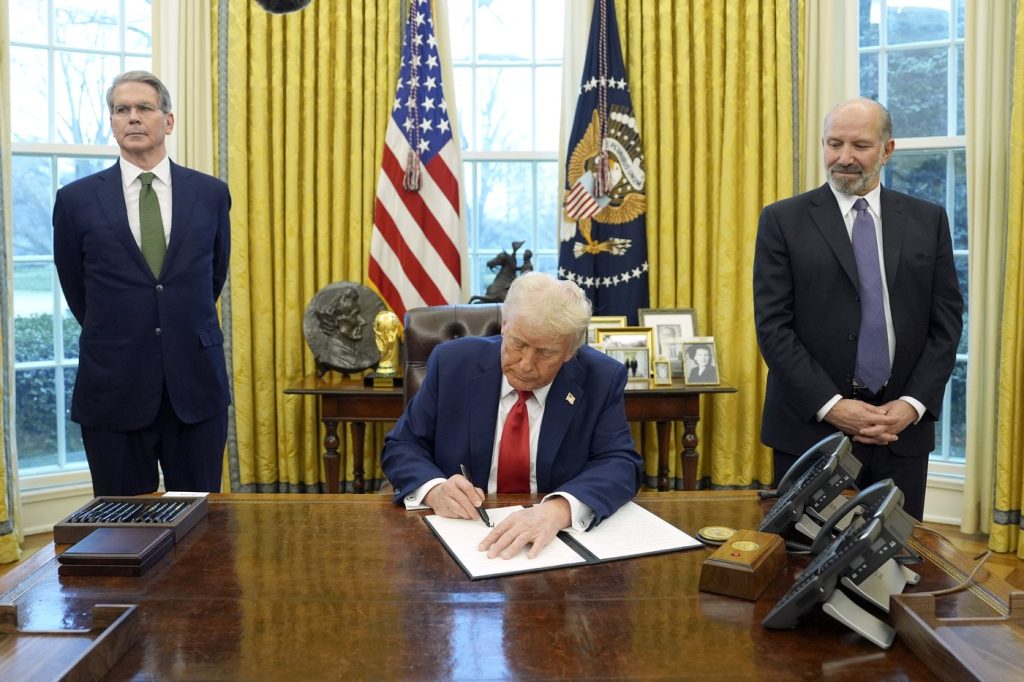A recent roundup from The Canadian Press highlights pressing issues regarding the Canadian economy, particularly concerning tariffs imposed by the United States under President Donald Trump. Despite a temporary 30-day pause announced by Trump on tariffs scheduled to take effect, uncertainty still looms over the Canadian economy. The tariff reprieve halts what could have escalated into a continental trade war, a scenario economists on both sides of the border warned could lead to rising prices across various sectors.
Canada, in response to Trump's announcement, also paused its retaliatory measures, which included imposing tariffs and bans on U.S. alcohol sales. However, Unifor, Canada’s largest private sector union, remains cautious, emphasizing that Trump's tariff threats continue to jeopardize Canadian jobs. Over the past weekend, Trump signed an order that would have imposed 25% tariffs on most Canadian imports, alongside a lower 10% tariff on Canadian energy. The continuation of such threats could significantly impact Canadian industries and labor stability.
The trucking sector, vital for trade between Canada and the U.S., has voiced serious concerns regarding the anticipated tariffs. Stephen Laskowski, president of the Canadian Trucking Alliance, warned that the imposed tariffs could devastate the industry, which is already experiencing struggles due to reduced consumer demand. With thousands of transport companies facing financial challenges, the tariffs could represent a defining moment for many operators within the sector. The 25% tariffs, though delayed for a month, mark a potential major shock to Canadian-American trade relations, categorically altering market conditions across the board.
In the political arena, leaders from Ontario's major parties are currently campaigning amidst the uncertainties of U.S. tariff threats. Progressive Conservative Leader Doug Ford, NDP Leader Marit Stiles, and Liberal Leader Bonnie Crombie made announcements in several cities, including Ottawa and Brampton. The snap election called by Ford will take place on February 27, 2025, and party leaders are aligning their messages with the recent developments in trade relations amidst heightened public interest and concern.
In a separate but significant case, the trial of two teenage girls accused of the murder of a homeless man in Toronto continues to unfold. The court proceedings are expected to include additional security video footage of the incident that occurred on December 18, 2022, resulting in the death of Kenneth Lee. The teenage girls involved have pleaded not guilty to second-degree murder, though the younger girl has attempted a plea of guilty to manslaughter, which the Crown has rejected.
Moreover, Canadian consumers appear to be using their purchasing power to express their views on the ongoing tariff situation and the political climate in the U.S. A notable instance is Vancouver finance worker Michael Atkinson, who returned his Tesla vehicle to the dealer, reportedly due to the threats of U.S. tariffs. Other consumers, like shopper Andrea Mitchell, emphasize the importance of supporting Canadian-grown products as a method of promoting national sovereignty and considering the long-term implications for the country
This week’s events reveal a complex interplay between economic policy, consumer behavior, and political strategy in Canada, reflecting a populace engaged in the impacts of external pressures, particularly from the U.S. Despite the temporary reprieve, the repercussions of potential tariffs continue to resonate throughout various sectors of the Canadian economy.










